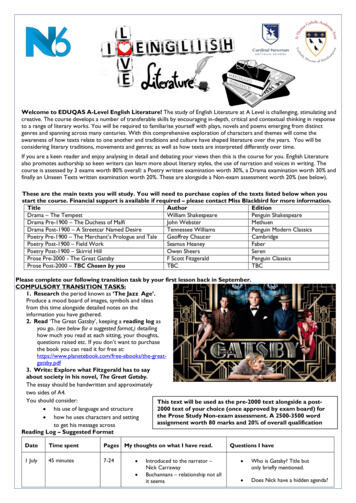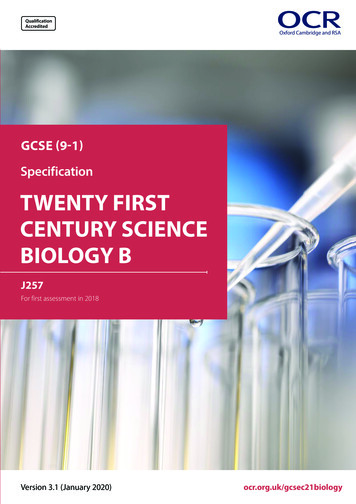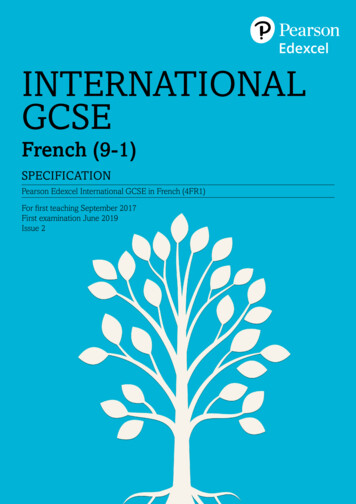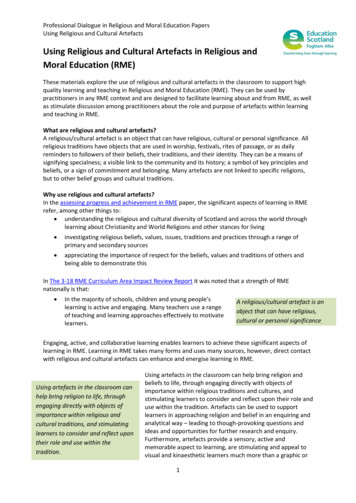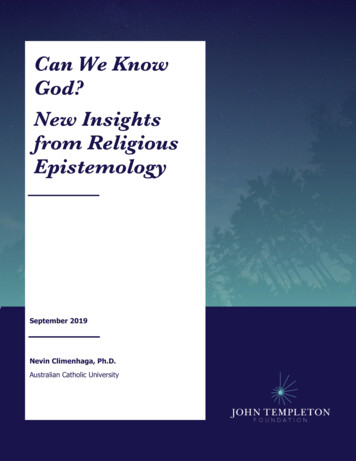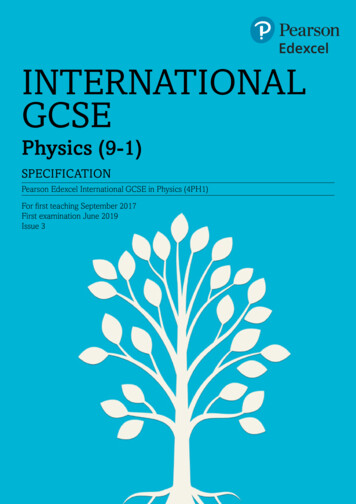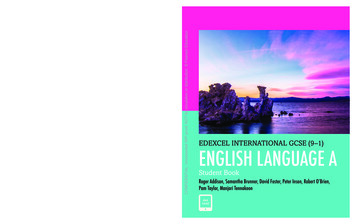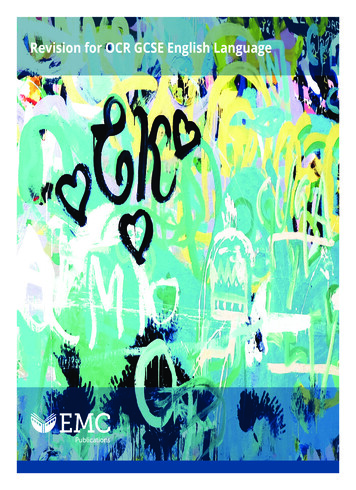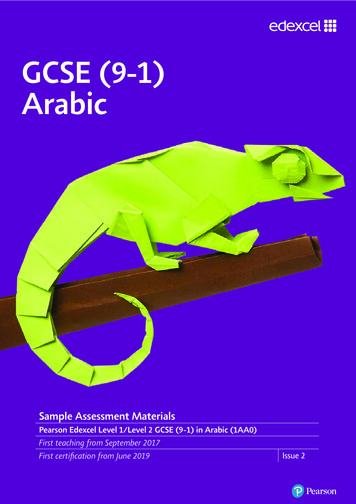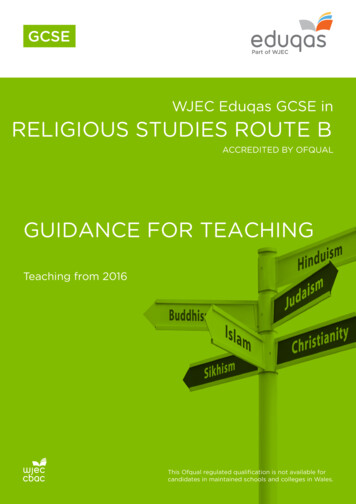
Transcription
GCSEWJEC Eduqas GCSE inRELIGIOUS STUDIES ROUTE BACCREDITED BY OFQUALGUIDANCE FOR TEACHINGTeaching from 2016This Ofqual regulated qualification is not available forcandidates in maintained schools and colleges in Wales.
ContentsIntroduction3DfE Subject Content4Continuing Professional Development4Specification Overview5Component 1: Foundational Catholic Theology7Component 2: Applied Catholic Theology9Component 3: Study of a World Faith11Non-Religious Sources of Wisdom and Authority13Further Support and Resources13Examinations and Assessment14Assessment of Spelling, Punctuation and the Accurate Use of Grammar (SPaG) 1316Suggested Frameworks for Delivery17Frequently Asked Questions25Glossary of Concepts28Appendix 133Appendix 237Appendix 3382
IntroductionThe WJEC Eduqas GCSE in Religious Studies (9-1) specification is available for teaching fromSeptember 2016. The first full GCSE awards for this specification will be made in summer2018. The specification can be delivered and assessed in centres in England, as well as inindependent schools in Wales, Northern Ireland and the Channel Islands.The WJEC Eduqas GCSE in Religious Studies (9-1) specification fully meets the requirementsof the DfE subject content for Religious Studies. Additionally, the board has worked closelywith faith communities, SACREs and other interested parties to ensure that thespecification will fully meet the needs of learners, and fulfil the statutory requirements forReligious Education.This Guidance for Teaching publication is one of a number of ways in which WJEC Eduqasprovides assistance to teachers delivering this specification. This guide is to be used inconjunction with, and as a supplement to the Specification and Sample AssessmentMaterials (question papers and mark schemes). It is not intended as, and cannot be used asa replacement for either of these essential materials.Other provision which you may find useful is: easy access to the specification and other key documents on the WJEC EduqaswebsiteCPD advice available via the WJEC Eduqas websiteFace-to-face CPD at a range of venues across Englanda free half-day visit to your school from one of our local representatives, to help youto plan your delivery of the new specificationadditional, free-to-access, digital resources on specific options available from Spring2016 on the website, which can be used by both teachers and learnerseasy access, by telephone or email, to both the Subject Officer and Subject SupportOfficer for GCSE Religious Studiesopportunities to become an examiner for the new specificationContact points for WJEC Eduqas GCSE in Religious Studies (9-1) are as follows:Lynda Maddocklynda.maddock@eduqas.co.uk029 2026 5122(Subject Officer)Christopher Barfoot christopher.barfoot@eduqas.co.uk 029 2026 5094(Subject Support Officer)Subject page: es3
DFE Subject ContentThis guidance has been written to give support and advice regarding the WJEC EduqasGCSE specification in Religious Studies. Major changes have taken place to existingspecifications following the publication of the DfE subject content for reformed GCSEqualifications in Religious Studies.The DfE stipulates six requirements for GCSE Religious Studies. It states that GCSEspecifications in Religious Studies must require students to: demonstrate knowledge and understanding of two religions; demonstrate knowledge and understanding of key sources of wisdom and authorityincluding scripture and/or sacred texts, where appropriate, which support contemporaryreligious faith; understand the influence of religion on individuals, communities and societies; understanding significant common and divergent views between and/or within religionsand beliefs; apply knowledge and understanding in order to analyse questions related to religiousbeliefs and values; construct well-informed and balanced arguments on matters concerned with religiousbeliefs and values set out in the subject content below.More information on the DfE’s Religious Studies subject content can be found loads/attachment data/file/403357/GCSE RS final 120215.pdfContinuing Professional DevelopmentCPD has been delivered to assist in explaining the WJEC Eduqas GCSE in Religious Studiesqualification. WJEC Eduqas will continue to deliver CPD in England for each year of thequalification.Please use the following link to search for CPD events and make d CombinationsCentres may follow EITHER Route A OR Route B of this specification.4
Specification OverviewRoute B is only available as a full course qualification. It is the Route which will be studied byCatholic centres. In line with DfE requirements, the WJEC/Eduqas Religious Studies GCSE isa linear qualification and must, therefore, be studied across two years, with examinationstaken at the end of this period, in May or June. Hence, in all cases, a student commencingthe GCSE Religious Studies course in September 2016 will sit all three examinations inMay/June 2018.Route B is the path of study to be taken by Catholic centres. It takes a distinctive issuesbased approach to the study of Catholic Christianity. This route will enable learners to gainknowledge and understanding of two religions: Catholic Christianity and Judaism. Route Bcomprises a 75% study of Catholic Christianity, alongside a 25% study of Judaism. Instudying Components 1 and 2, candidates will engage in a study of Catholic Christianitythrough themes. To foster a broad and balanced understanding of religion in the worldtoday, the thematic study of both Components 1 and 2 will also require learners to contrastCatholic responses to philosophical and ethical question with responses given by otherChristian denominations and, for Component 1 ONLY, Judaism, where appropriate. InOrigins and Meaning only, candidates must also consider non-religious world views.Throughout Route B, learners will be expected to make reference to relevant sources ofauthority and wisdom, and to be familiar with those sources stipulated in the specification,under ‘specific content’.5
Route B at a Glance6
Component 1:Foundational Catholic TheologyThemes1. Origins and Meaning2. Good and Evil*Awareness of non-religious perspectiveswill be assessed within this theme.Areas ofStudyOrigins and MeaningGood, Evil and SufferingBeliefs: CreationBeliefs: TrinitySources: The BibleBeliefs: IncarnationForms: PaintingSources: Jesus and moral authorityForms: SymbolismForms: Sculpture and StatuaryPractices: Loving and Serving inCatholic communities in Britain andelsewherePractices: Popular devotion aspractised in Catholic communitiesin Britain and elsewhereConceptscreation ex nihiloconscienceLearnersshould beable toexplain andapply theseconcepts inrelation tothe theme.evolutionevilimago ionrevelationNatural smentWritten examination: 1½ hours37.5% of qualification90 marks (plus 6 for spelling, punctuation and grammar)Spelling, punctuation and grammar marks on question 1(d)7
Component 1 is delivered through the study of the two themes shown above. Learners willbe expected to demonstrate an understanding of the influence of religion on individuals,communities and societies. They will be expected to support their responses usingappropriate knowledge and understanding of key sources of wisdom and sacred texts.These texts might include, for example: the Bible; extracts from the documents of Vatican IIor other ecumenical councils, extracts from Papal encyclicals and exhortations, extractsfrom the work of key theologians and thinkers such as St Augustine of Hippo as well as theviews of past and current philosophers (including ethical philosophers).Learners must show awareness of varied interpretations of sources and/or teachings andhow these may give rise to diversity within traditions or textual studies on religious,philosophical and ethical studies in the modern world. Candidates will be expected todemonstrate an understanding of different perspectives. Each theme contains eightconcepts, as shown above, which learners should be able to explain and apply in relation tothe areas studied.Theme 1: Origins and MeaningThis theme requires learners to consider religious and non-religious beliefs about theorigins and value of the universe and human life. Learners are expected to make relevantreferences to scripture, other sources of authority and contrasting scientific and/or nonreligious world-views such as those held by Atheists and Humanists. This theme must,where appropriate, also be studied from the perspective of Judaism.Theme 2: Good and EvilThrough studying this theme, learners consider philosophical questions concerning theorigins and nature of good and evil and different religious answers to the problem of eviland suffering. Learners are expected to make relevant references to scripture and othersources of authority. This theme must, where appropriate, also be studied from theperspective of Judaism.8
Component 2:Applied Catholic TheologyThemes3. Life and Death4. Sin and ForgivenessAreas ofStudyDeath and the afterlifeCrime and PunishmentBeliefs: EschatologyBeliefs: RedemptionSources: The MagisteriumSources: ChurchForms: ArtefactsForms: BuildingsForms: Music and the funeral ritePractices: SacramentsPractices: Prayer within Catholiccommunities in Britain andelsewherePractices: Mission and Evangelisation inBritain and elsewhereConceptsdeathabsolutismLearnersshould beable toexplain andapply theseconcepts inrelation tothe theme.eternal salvationsoulsinAssessmentWritten examination: 1½ hours37.5% of qualification90 marks (plus 6 for spelling, punctuation and grammar)Spelling, punctuation and grammar marks on question 1(d)9
Component 2 consists of the study of two further themes, as shown above. Learners will beexpected to demonstrate an understanding of the influence of religion on individuals,communities and societies. Responses should be supported using appropriate knowledgeand understanding of key sources of wisdom and sacred texts; which might include, forinstance: the Bible; extracts from the documents of Vatican II or other ecumenical councils,extracts from Papal encyclicals and exhortations, extracts from the work of key theologiansand thinkers such as St Augustine of Hippo as well as the views of past and currentphilosophers (including ethical philosophers).Learners must be aware how varied interpretations of sources and/or teachings may giverise to diversity within traditions or textual studies on religious, philosophical and ethicalstudies in the modern world.A consideration of diversity of belief (within a religion or across religions) is NOT requiredfor this Component.Each theme contains eight concepts, shown above, which learners should be able toexplain and apply in relation to the areas studied.Theme 3: Life and DeathThe compulsory nature of this component ensures that learners know and understand thefact that the religious traditions of Great Britain are, in the main, Christian. This knowledgemay be applied throughout the assessment of the specified content.This theme requires learners to consider religious beliefs about the nature of life anddeath. Learners are expected to make relevant references to scripture and other sourcesof authority.Theme 4: Sin and ForgivenessThis theme requires learners to consider philosophical questions concerning the nature ofcriminality and the rationale for punishment. Through a study of teachings and beliefs,questions relating to the justifiability of capital punishment will be explored. Learners areexpected to make relevant references to scripture and other sources of authority.10
Component 3:Study of a World FaithAreas of StudyStudy ofa WorldFaithBeliefs and TeachingsPracticesJudaismThe Nature of GodWorship: practices inBritain and elsewhereMessiah (Mashiach)The SynagogueCovenantRitualsLife on EarthDaily LifeThe AfterlifeFestivals: practices inBritain and ahmitzvotMessiahCovenantAssessmentWritten examination: 1 hour25% of qualificationNo additional marks available for spelling, grammar and punctuationComponent 3 engages learners in a systematic study of living Judaism. Candidates will learnabout the beliefs and teachings AND practices of Judaism as a living world faith. There areeight concepts which are to be seen as overarching and central ideas informing the studyof Judaism. These should be understood by learners, who should be able to apply them inrelation to this world faith.Learners should be aware that Judaism is one of a diverse range of religious traditions andbeliefs in Great Britain today, whilst the main religious tradition in Great Britain isChristianity. This knowledge may be applied throughout the assessment of the specifiedcontent.Learners must know, understand and express common and divergent views and the basisfor beliefs, teachings and practices. References to relevant sources of wisdom and authorityare expected, including scripture and/or sacred texts.11
Non-Religious ContentThis section of the Guidance for Teaching is intended to give a brief overview of the specificrequirements and to direct teachers to places where they can find additional support andresources.The latest British Social Attitudes Survey (2014) found that almost 51% of people claimed tohave no religion, and the figure was almost 69% for people aged 18-24. Non-religious worldviews are increasingly a feature of British society and must be included within the contentof the specification. As a Religious Studies qualification, there is no requirement for asystematic study of non-religious perspectives, but learners will be expected to know andunderstand the non-religious perspectives stipulated in the specification. In addition, theymay refer, where appropriate, to non-religious world views.Within the specification ‘belief’ should be understood to encompass both religious and nonreligious world views. There are specific questions in which learners are required todemonstrate knowledge and understanding of non-religious perspectives. These are setout below:Specific Non-Religious ContentCandidates may make reference to non-religious belief in all of the (d) questions, but mustdo so in the following question:Component 1Foundational Catholic TheologyArea of Study: Origins and MeaningQuestion 1(d)12
Non-Religious Sources of Wisdom and AuthorityThere is a wide array of sources of wisdom for non-religious world views. Among these areeminent scientists, philosophers and ethicists past and present. As with the religiouscontent, learners may make reference to sources of wisdom for non-religious world viewsnot mentioned in the specification, but they should be able to demonstrate a clearunderstanding of the following sources of wisdom stipulated in the specification: Charles DarwinRichard DawkinsStephen HawkingPeter SingerLearners should also demonstrate awareness of the Humanist organisation: Humanists for a Better WorldFurther Support and ResourcesWJEC EduqasA more detailed and comprehensive guide to teaching about non-religious perspectives,tailored to the WJEC Eduqas Religious Studies specification, will be available on the EduqasDigital Resources site, accompanied by a range of free-to-access digital resources for thenon-religious content of this specificationThe British Humanist Association (BHA)The British Humanist Association (BHA) has an excellent and extensive range of educationalresources on its website: http://understandinghumanism.org.uk . The BHA can arrange fortheir accredited speakers to visit your school to deliver talks and workshops to learners,tailored to your specific requirements.13
Examinations and AssessmentCommand WordsWhichquestion(s)?MeaningDefine . AO1Definition of a key term ('What is meant by 'Describe .AO1Demonstrate knowledge and understanding bydescribing a belief, teaching, practice, event etc.Explain .Demonstrate knowledge and understanding of a topicby giving a full explanation including supporting thestatements made with reasoning and/or evidence e.g.AO1A (2 marks)B (5 marks)C (8 marks)Explain how.Explain why.Explain the main features of.Explain the importance/ significance of.Explain questions for question (c) in Component 1ONLY ask for diversity within traditions or acrossreligions (see SAMs and specific level descriptor)Commandwords – A02Discuss .Discuss this statement showing that you haveconsidered more than one point of view (you mustrefer to religion and belief in your answer). Evaluationof a view from more than one perspective.N.B: ‘Belief’ can also mean non-religious belief. InComponent 1 qu. 1(d) in Route B require specificreference to non-religious beliefs to be included.Subjective personal responses per se will not becredited – see level descriptors.14D (15 marks)
Assessment Objective 2 is assessed in the (d) questions ONLY.Candidates are required to analyse and evaluate. They must use their knowledge ofreligion, religious teachings and moral reasoning (and, if appropriate, non-religious beliefs)to offer alternative OR different perspectives and viewpoints and formulate judgementsabout those viewpoints. They may offer personal opinions but if they do not also offer viewsbased on religious (and non-religious, if appropriate) beliefs, their response will not becredited. To gain the higher levels they must use religious language and sources of wisdomand authority.During the life of this specification, assessed example responses will be available on theOnline Exam Review (OER) area of the Eduqas website. Until the first examinations series in2018, example responses will be available via a link on the Eduqas Resources site.Resources to support responses to examination questions are to be found in Appendices1, 2 and 3.15
Assessment of Spelling, Punctuation and the Accurate Use of Grammar(SPaG)Band Performance DescriptionsHigh performance5 – 6 marks Learners spell and punctuate with consistent accuracyLearners use rules of grammar with effective control of meaning overallIntermediate performance3 – 4 marks Learners spell and punctuate with considerable accuracyLearners use rules of grammar with general control of meaning overallThreshold performance1 – 2 marks Learners spell and punctuate with reasonable accuracyLearners use rules of grammar with some control of meaning and any errors do notsignificantly hinder meaning overall The learner writes nothingThe learner’s response does not relate to the questionThe learner’s achievement in SPaG does not reach the threshold performance Band,for example errors in spelling, punctuation and grammar severely hinder meaning0Which questions carry SPaG marks?Component 1: Foundational Catholic TheologyComponent 2: Applied Catholic TheologyQuestion 1(d)Question 1(d)Up to 6 marksUp to 6 marksTOTAL MARKS AVAILABLE FOR SPaG: 12There are no SPaG marks awarded for Component 3 (Study of a World Religion).16
Suggested Frameworks for DeliveryAt WJEC Eduqas we acknowledge that the Religious Studies GCSE will be delivered in avariety of contexts across a wide and diverse array of centres. With this in mind, a ‘one sizefits all’ approach is not possible. In addition, the GCSE is linear, to be delivered over a twoyear period and there is no prescribed order for the delivery of components and/or areasof study. Rather, decisions of this sort must be left to the professional judgement ofteachers. It is up to teacher how to present the course, but all aspects must be studied.Below are some outline schemes of learning, which provide suggestions for how someaspects of the course may be delivered. It is hoped that teachers will find these frameworkshelpful and adaptable to their own particular context.Additional outline schemes of learning can be found here.17
Suggested Outline FrameworkStudy of a World Faith: JudaismNo.TopicKey Question1Introduction toUnitSuggested scheme of learning (Y10 April-Summer)Why do we study other faiths?256The Nature of God4What is Shekinah?Overview of the unitFormulating questions about thetopic – What is good? What is evil?What do we already know about Judaism?What do Jews believe about God as a Law-Giverand Judge?Possible learningactivities/resourcesKeywords and keyword testN/AWhat do Jews believe that God is like?3Teachers notes (from specification)Issues of God as: One, Creator:Genesis 1:3-5; 1:26-28, The ShemaLaw-Giver and Judge: Exodus 20:117The nature and significance ofshekinah (the divine presence)Why is Shekinah ticle/feeling-the-presence-of-god/
8http://www.jewfaq.org/mashiach.htmWhat is the Mashiach?Messiah7What do Orthodox Jews believe about thenature and role of the Messiah?Different views within Orthodox and ReformJudaism about the nature and role of theMashiach (Messiah); special person who bringsan age of peace, ourselves, his arrival assignalling the end of the world, praying for hiscoming, concerned more with living life accordingto the mitzvot10What is a cles/4714-covenant11What is the Abrahamic Covenant?The meaning and significance of the AbrahamicCovenant: Genesis 12:1-3, 17:6-8, 17:11-14including the importance of the ‘Promised aism/history/firstcovenant.shtmlWhat is the Covenant with Moses at Sinai?The meaning and significance of the Covenantwith Moses at Sinai: Exodus 3:11-15 including thecontinuing importance of the idea of a ligions/judaism/history/secondcovenant.shtmlWhy are the Ten Commandmentsimportant to Jews?Importance of the Ten Commandments: ant9What do different groups of Reform Jewsbelieve about the nature and role of /the-messianicconcept-in-reform-judaism/19
What do Jews believe about the sanctity oflife?15Life on Earth14What are the 613 mitzvot?What is the relationship between the 613mitzvot and free will?17What do we understand by life afterdeath?1819The Afterlife16What are Orthodox Jewish beliefs aboutlife after death?Beliefs and teachings about the nature andimportance of Pikuach Nefesh(sanctity of life):Genesis 1:26-27, Talmud B Yoma 84b, Psalm139: 13-15, Jeremiah 1:5The relationship between free will and the613mitzvot (duties) between humans and withGodOrthodox and Reform beliefs and teachingsabout life after death, judgement andresurrection; spiritual and/or bodily resurrection,immortality of the soul and the belief that wemust focus on this life in preparation forwhatever happens in the nextWhat are Reform Jewish beliefs about lifeafter daism/jewishethics/abortion .co.uk/education/guides/zm2tb9q/revision
202122Worship in Britain and udaism/worship/synagogue 1.shtmlHow do Orthodox Jews worship in thesynagogue?The nature and importance of Orthodox andReform synagogue services; Shabbat service, thesignificance of prayer including the standingprayer uesHow do Reform Jews worship in thesynagogue?How do Jews worship in the nagogueWorship in the home; siddur, recitation of Shemaand ModehAni, display of mezuzah. Theimportance of preparing for and celebratingShabbat: Exodus 20:8-10. Items worn forworship; tallith, tefillin and daism-at-home/
Features of synagogues in Britain: significance ofbimah, aron hakodesh, Torah scrolls, ner tamid,seating, minyan; Exodus 20:4-524How do British synagogues work to serveJewish communities in Britain?Worship, social and community functions ofsynagogues serving Jewish communities inBritain.2526The Synagogue and Daily Life23What are the features of a synagogue k/religion/religions/judaism/texts/torah.shtmlHow are the Tenakh and the Talmudsignificant in Jewish daily life?Significance of use of the Tenakh and the Talmudin daily .org.uk/whatdoe.htmHow does a Jew keep Kosher in Britain?Dietary laws: kosher, treyfah, parev, theprohibition of milk with meat, requirements of akosher kitchen: Leviticus 11:1-23Keeping kosher in Britain: benefits .htmlhttp://www.kosher.org.uk22
http://www.jewfaq.org/birth.htmWhat is Brit Milah?The role and importance of Brit Milah: Covenant,identity, features of the ceremony28What is Bar Mitzvah?Bar Mitzvah: Law and personal responsibility,features of the ceremony29What are the different views of BatMitzvah and Bat Chayil?Orthodox and Reform views regarding BatMitzvah and Bat Chayil and features of on/33031What are the features of a Jewishmarriage ceremony?How do Jews mourn for the dead?Marriage: Genesis 2: 24, features of theceremonyMourning rituals: onan, kaddish, sheva, yarzheit.Role of chevra kaddisha23https://www.youtube.com/watch?v rrkxnb/revision/4
What is Rosh Hashanah?The origin, meaning and celebration of RoshHashanah33What is Yom Kippur?The origin, meaning and celebration of YomKippurWhat is Pesach?The origin, meaning and celebration of Pesach34Festivals3235What is Sukkot?The origin, meaning and celebration of Sukkot36Where are the differences in practicebetween different Jewish traditions?The diversity of practice between different ducation/guides/zbb42hv/revision/6
Frequently Asked QuestionsQ. What is the recommended number of hours in which to deliver the full courseGCSE in Religious Studies?A. Eduqas WJEC acknowledges that the GCSE Religious Studies will be delivered in a widevariety of different contexts across centres, and therefore, does not stipulate arecommended number of guided learning hours through which the GCSE qualificationshould be taught. Whilst the Department for Education has recommended 120 hours ofguided learning over the two year linear course, we realise that centres have quite differenttime allocations.Q. How can learners show awareness of diversity within the different themes?A. Route B Component 1 is taught from the perspective of Catholic Christianity, withappropriate reference made to diversity within Christianity and from Judaism. Anunderstanding of diversity within Christianity in Component 2 is also expected. Judaism istaught as a world religion in Component 3.Q. What about non-religious beliefs?A. In Route B, non-religious beliefs are explicitly targeted in the (d) question of Component1 Origins and Meaning ONLY, question 1(d). Candidates may receive credit for reference tonon-religious perspectives in all (d) questions, but will disadvantage themselves if they donot do so in this question. There is a separate marking band for this particular question.Q. Are all (a) questions taken from the eight key concepts?A. Yes.Q. Are there questions explicitly requiring diversity in components 2 and 3?A. NoQ. What about spelling, punctuation and grammar (SPaG)?A. SpaG is awarded only for Components 1 and 2 (the first d. questions ONLY). 6 x 2 12marks for SPaG. No marks for SPaG are available in Component 3.25
Q. Are candidates required to fill all of the lines given in the question papers?A. No. The answer booklet will allow three lines per mark, but there is no requirement to fillthe lines. Extra space at the back of the answer booklet will be available for candidates whowrite more.Q. Will the questions always be worth the same number of marks?A. Yes.Q. Will the pattern of questions remain the same?A. Yes; (a) is a definition type question, (b) is a describe type question, (c) is an explain typequestion and (d) is a discuss/evaluate type question. This pattern will remain the case in livequestion papers.Q. Will candidates be required to know exact references for sources of wisdom andauthority, or quote them word for word?A. No. Candidates will be expected to know, understand and be able to apply theseteachings in their responses, but they do not need to give exact references or quote wordfor word, though they are free to do so. Separate 'Sources of Wisdom and Authority TextReferences' booklets are available in the Resources section of the Eduqas website.Q. What about the short course?There is no short course option for Route B.Q. Which Components should be taught first?A. The order in which Components are delivered is entirely at the discretion of the Centre.It is essential that all the material on the specification is taught.26
Q. I’ve never taught about Humanism or atheism before. What support is there forteachers who may be unfamiliar with this content?A. WJEC Eduqas will have a range of digital, free to access resources on non-religiousperspectives, tailored to our GCSE Religious Studies specification. In addition, the BritishHumanist Association (BHA) has an excellent and extensive range of educational resourceson its website: http://under
These texts might include, for example: the Bible; extracts from the documents of Vatican II or other ecumenical councils, extracts from Papal encyclicals and exhortations, extracts from the work of key theologians and thinkers such as St Augustine of Hippo as well as the views of past and current philosophers (including ethical philosophers).
